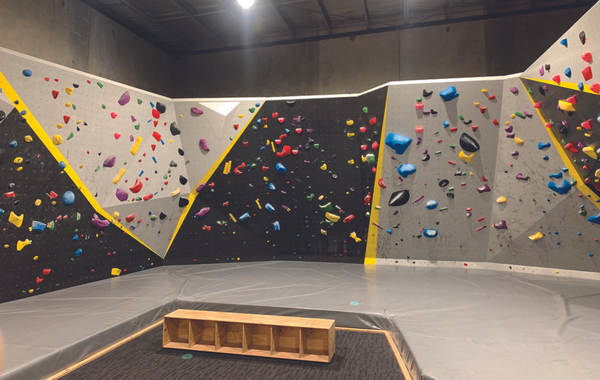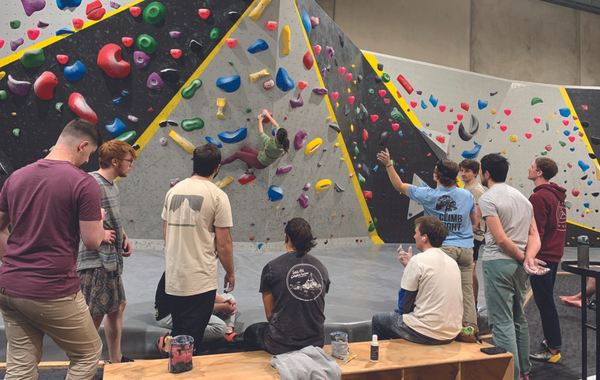Bouldering into the fitness scene
Perhaps when you think rock climbing, images of mountains, heights and ropes comes to mind, but there is a trendier form of climbing in town, and it doesn’t involve ropes or even heights.
Bouldering gyms are gaining attention and drawing in climbers from new to expert.
Unlike other forms of rock climbing, bouldering doesn’t include ropes, ropes, or harnesses, or partners. Instead, climbers face the boulders with nothing but themselves, chalk and climbing shoes, and the ability to problem solve.

Owner of Industry Boulders, Grovedale, Aden Anderson said bouldering is a discipline of rock climbing that involves indoor or outdoor climbing of walls, or boulders.
“Top roping, lead climbing, and free soloing and bouldering are all disciplines that fall under rock-climbing,” Anderson said.
“The global standard height of bouldering walls is about 4.5 metres to the top indoors, so your hands are never higher than that. You’re normally bouldering over foam matts, and [one of the] safety requirements are you learn how to fall; we call bouldering a little bit more high impact.”
Anderson said the mental and physical benefits of climbing were equally prominent.
“Mentally, I don’t think of anything else but climbing so mentally focus on the task is a good escape.
“Movement wise, bouldering and rock climbing in general use so many different muscle groups: legs, core, arms. It’s not just an upper body sport, there is so much leg work involved.
“At an elite level climbing we say it’s your ability to use your legs to support your upper body that helps.”
Climbers can boulder indoors, with matts built into gym floors, or outdoors using mats placed beneath the boulders.
Around Greater Geelong, climbers often find outdoor walls in the You Yangs, or travel further afield to the Grampians or Mt Arapiles.
The route a climber is attempting to scale is often referred to as a project.
Anderson said bouldering appeals to those who don’t enjoy team sports, but while it is a solo sport, it is still very social.
“Most people that get into bouldering don’t get into team sports environments it’s more that individual climb, or you can climb with friends. A lot of people who enjoy surfing enjoy climbing, because it’s a sport you can do by yourself that’s definitely a good mental challenge and a physical challenge,” Anderson said.
“Socially climbing is great, being around like-minded people.
“As much as it’s a solo sport you can do it in a team environment because everyone is there doing the same thing.
“You’re pushing your limits until you fall and then you try again… failure is you falling, and everyone is in the same boat; whether you’re at a high level or a beginner, everyone is falling.”

Anderson said climbers tackle a project with their own strengths and weaknesses in mind, whether that be their flexibility, height, strength or something else.
“Bouldering caters to the problem solving, that physical problem-solving trying to figure out the most efficient way to complete a route,” he said.
“But most bouldering gyms go from easy – so you can walk off the street and be able to do it – up to very hard where expert, seasoned climbers can work on what we call projects.”
Indoor climbing gyms are often graded by a common grading system, which is also used in outdoor climbs is the V scale.
For the V scale, the higher the number, the harder the problem, with the hardest boulder problems in the world are rated V16 and V17 (which only a handful of people in the world can climb).
Climbing gyms usually only see problems up to about V10.
“Grading systems vary gym to gym, because for indoor climbing, as much as everyone tries to replicate outdoor climbing, in reality it’s completely different,” Anderson said.
“Most indoor climbs are a bit more ergonomic and easy on the fingers.
“At Industry we use the V grading climbing system because we have a lot of climbers who do climb outdoors.”
Each week at Industry Boulders one section of the wall is changed, bringing in new problems and projects for climbers to tackle.


















